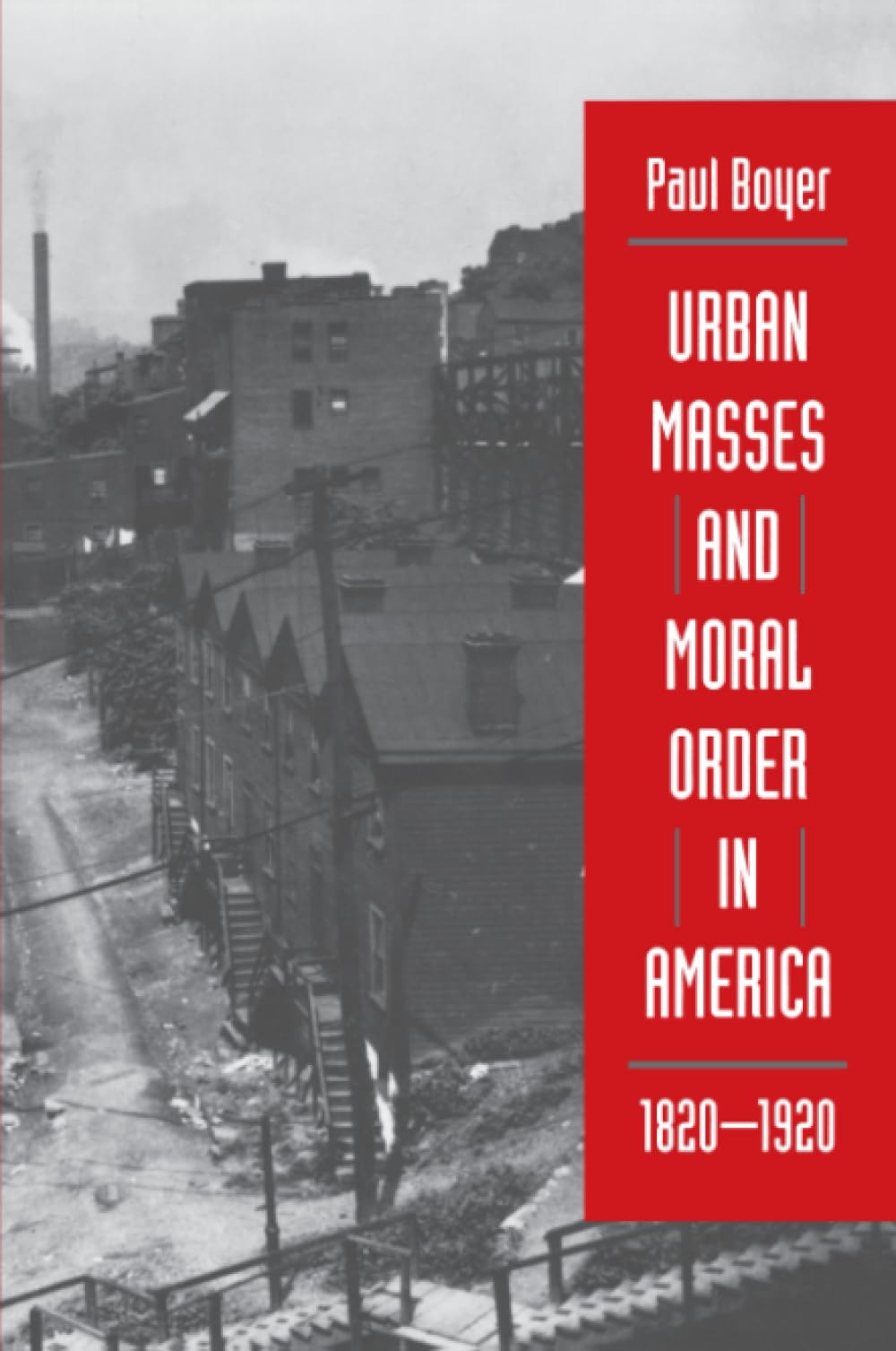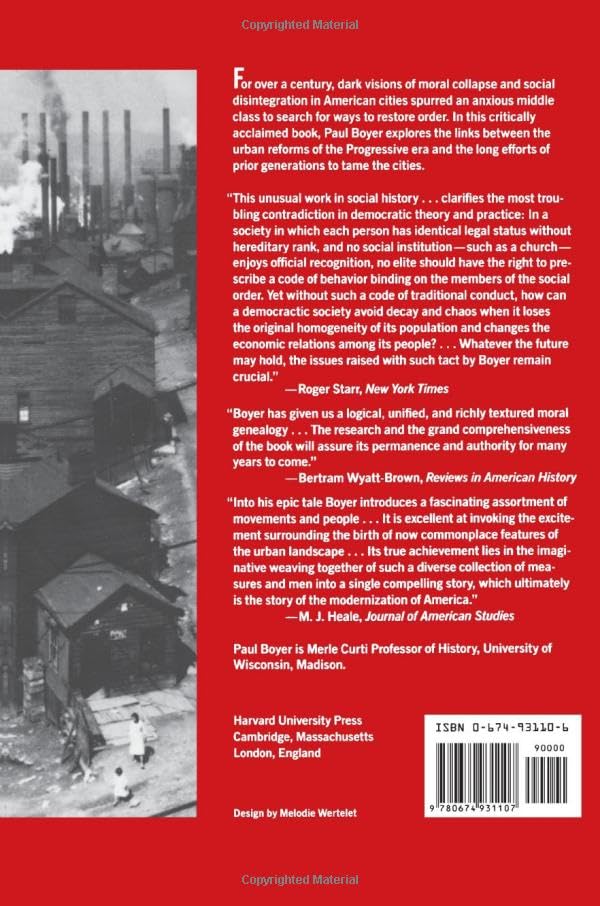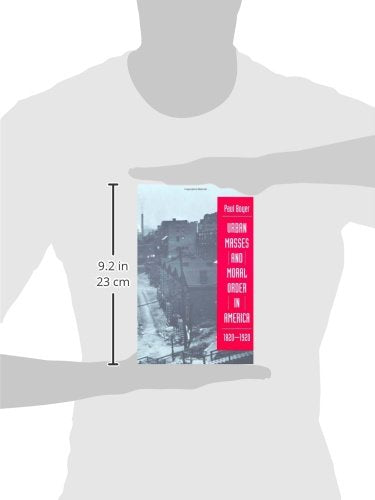
Title



Urban Masses and Moral Order in America, 18201920,New
Delivery time: 8-12 business days (International)
For over a century, dark visions of moral collapse and social disintegration in American cities spurred an anxious middle class to search for ways to restore order. In this important book, Paul Boyer explores the links between the urban reforms of the Progressive era and the long efforts of prior generations to tame the cities. He integrates the ideologies of urban crusades with an examination of the careers and the mentalities of a group of vigorous activists, including Lyman Beecher; the pioneers of the tract societies and Sunday schools; Charles Loring Brace of the Children's Aid Society; Josephine Shaw Lowell of the Charity Organization movement; the father of American playgrounds, Joseph Lee; and the eloquent city planner Daniel Hudson Burnham.Boyer describes the early attempts of Jacksonian evangelicals to recreate in the city the social equivalent of the morally homogeneous village; he also discusses later strategies that tried to exert a moral influence on urban immigrant families by voluntarist effort, including, for instance, the Charity Organizations' 'friendly visitors.' By the 1890s there had developed two sharply divergent trends in thinking about urban planning and social control: the bleak assessment that led to coercive strategies and the hopeful evaluation that emphasized the importance of environmental betterment as a means of urban moral control.
By changing our most important processes and
products, we have already made a big leap forward. This ranges from the
increased use of more sustainable fibers to the use of more
environmentally friendly printing processes to the development of
efficient waste management in our value chain.
⚠️ WARNING (California Proposition 65):
This product may contain chemicals known to the State of California to cause cancer, birth defects, or other reproductive harm.
For more information, please visit www.P65Warnings.ca.gov.
Shipping & Returns
Shipping
We ship your order within 2–3 business days for USA deliveries and 5–8 business days for international shipments. Once your package has been dispatched from our warehouse, you'll receive an email confirmation with a tracking number, allowing you to track the status of your delivery.
Returns
To facilitate a smooth return process, a Return Authorization (RA) Number is required for all returns. Returns without a valid RA number will be declined and may incur additional fees. You can request an RA number within 15 days of the original delivery date. For more details, please refer to our Return & Refund Policy page.
Shipping & Returns
Shipping
We ship your order within 2–3 business days for USA deliveries and 5–8 business days for international shipments. Once your package has been dispatched from our warehouse, you'll receive an email confirmation with a tracking number, allowing you to track the status of your delivery.
Returns
To facilitate a smooth return process, a Return Authorization (RA) Number is required for all returns. Returns without a valid RA number will be declined and may incur additional fees. You can request an RA number within 15 days of the original delivery date. For more details, please refer to our Return & Refund Policy page.
Warranty
We provide a 2-year limited warranty, from the date of purchase for all our products.
If you believe you have received a defective product, or are experiencing any problems with your product, please contact us.
This warranty strictly does not cover damages that arose from negligence, misuse, wear and tear, or not in accordance with product instructions (dropping the product, etc.).
Warranty
We provide a 2-year limited warranty, from the date of purchase for all our products.
If you believe you have received a defective product, or are experiencing any problems with your product, please contact us.
This warranty strictly does not cover damages that arose from negligence, misuse, wear and tear, or not in accordance with product instructions (dropping the product, etc.).
Secure Payment
Your payment information is processed securely. We do not store credit card details nor have access to your credit card information.
We accept payments with :
Visa, MasterCard, American Express, Paypal, Shopify Payments, Shop Pay and more.
Secure Payment
Your payment information is processed securely. We do not store credit card details nor have access to your credit card information.
We accept payments with :
Visa, MasterCard, American Express, Paypal, Shopify Payments, Shop Pay and more.
Related Products
You may also like
Frequently Asked Questions
- Q: What is the main theme of 'Urban Masses and Moral Order in America, 1820-1920'? A: The book explores the links between urban reforms during the Progressive era and earlier efforts to restore moral order in American cities, highlighting the anxieties of the middle class regarding social disintegration.
- Q: Who is the author of this book? A: The author is Paul Boyer, a noted historian who examines urban reform movements and social issues in America.
- Q: What time period does the book cover? A: The book covers the period from 1820 to 1920, focusing on the social and moral challenges faced by urban America.
- Q: Is this book suitable for academic study? A: Yes, the book is suitable for academic study, providing insightful analysis and historical context relevant to urban studies, sociology, and American history.
- Q: What is the condition of the book being sold? A: The book is listed as 'Used Book in Good Condition', indicating it has been previously owned but is still in a satisfactory state for reading.
- Q: How many pages does this book have? A: The book has 432 pages, providing a comprehensive exploration of its subject matter.
- Q: What type of binding does the book have? A: The book is available in paperback binding, which is commonly preferred for its portability and affordability.
- Q: When was 'Urban Masses and Moral Order in America' published? A: The book was published on March 1, 1992.
- Q: Does the book discuss specific activists or reformers? A: Yes, it discusses several key figures, including Lyman Beecher, Josephine Shaw Lowell, and Daniel Hudson Burnham, among others who were pivotal in urban reform efforts.
- Q: What are some key features of this book? A: Key features include in-depth historical analysis, discussions of moral influences on urban immigrant families, and an examination of early urban planning strategies.
